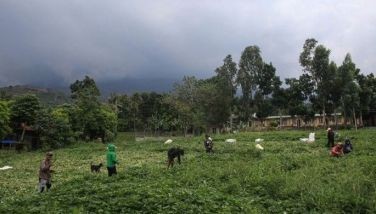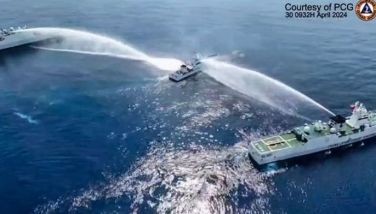Terror fight pushes RP-US ties to new high
October 11, 2003 | 12:00am
WASHINGTON — Philippine-US relations have risen to new levels now that Southeast Asia has become a second front in the US war against terrorism, and US President George W. Bush’s visit to Manila on Oct. 18 will serve to underscore the importance of the Philippines as a strategic ally, diplomatic analysts said.
Although Bush will be in Manila no more than eight hours, his presence will serve to reaffirm his resolve to enhance the capabilities of the Armed Forces of the Philippines (AFP) to counter terrorism without ruffling nationalist feathers, the analysts added.
Apart from photo opportunities and expressions of solidarity and cooperation, many analysts do not expect the Bush visit to produce major results, particularly for the Philippines, since President Arroyo came home from Washington only last May with a huge package of benefits, including about $100 million in military aid and US business commitments to invest $3.2 billion in the country.
Bush then designated the Philippines a major non-NATO ally, giving it greater access to US defense equipment and supplies and enabling both countries to work together on military research and development.
The consensus among foreign policy experts here is that the visit will be more form than substance.
"I don’t expect any major deliverables (to the Philippines), as perhaps there would be in Thailand," said Catharin Dalpino, a George town University professor on Southeast Asian politics.
Bush leaves Washington next week for an eight-day trip to Southeast Asia, with stops in Tokyo (Oct. 17-18), Manila (Oct. 18), Bangkok (Oct. 18-20), Singapore and Indonesia (Oct. 21-22) and Australia (Oct. 22-23).
For security reasons Bush’s destination in Indonesia has not been announced, but reports are he will visit Bali, where terrorists bombed two nightclubs last October and killed 202 people, many of them Australians.
Citizens from 21 countries died in the blasts, including 26 Britons, 36 Indonesians, seven Americans, six Germans and nine Swedes.
RP-US relations actually waned in 1991 after the Philippine Senate voted to close down all US military bases in the country, but have since been revitalized by the war against terrorism.
"US-Philippine relations have grown closer in recent years," said Assistant Secretary of Defense, International Security Affairs, Peter Rodman at a Senate hearing.
"Our two governments share concerns over growing evidence of links between Philippine and international terrorist organizations, including Jemaah Islamiyah."
Last year hundreds of US troops were deployed in Basilan for six months to help the AFP hunt down Abu Sayyaf terrorists holding American missionaries Martin and Gracia Burnham.
The Abu Sayyaf and the Indonesia-based Jemaah Islamiya are extremist groups said to be linked to Osama bin Laden’s al-Qaeda terror network, which masterminded the attacks against US targets on Sept. 9. 2001, killing nearly 3,000 people.
Dana Dillon, a senior policy analyst at the think-tank Heritage Foundation, said even if nothing major comes out of the visit "just the fact that he shows up is important," particularly since Bush’s bodyguards wanted him to skip Manila because of security concerns.
Bush was originally supposed to make a two-day state visit to the Philippines, but this was severely curtailed after Fathur Rohman al-Ghozi, a senior JI member escaped from jail in Camp Crame, Quezon City last July 14, followed by a failed military uprising against Mrs. Arroyo two weeks later.
Unlike many analysts who think the Bush visit to Manila will favor Mrs. Arroyo, Dillon sees it as a "win-win" for both presidents.
It will raise Mrs. Arroyo’s credibility just weeks after she reneged on a promise not to run for a new six-year term, he said.
At the same time it will cement Bush’s stature as a man who keeps his word to reinforce an ally in the war on terrorism, he added.
Bush is "looking for more flags in Iraq" and a more robust support from Mrs. Arroyo and other Southeast Asian leaders for US efforts in rebuilding that country will help tamp his political problems over Iraq, Dillon said.
Dillon dismissed leftist fears in Manila that Bush might press for the reestablishment of US military bases in the Philippines.
"Nobody that I know of in the administration, the Department of Defense or the Department of State is interested in having bases in the Philippines," he said.
Although Bush will be in Manila no more than eight hours, his presence will serve to reaffirm his resolve to enhance the capabilities of the Armed Forces of the Philippines (AFP) to counter terrorism without ruffling nationalist feathers, the analysts added.
Apart from photo opportunities and expressions of solidarity and cooperation, many analysts do not expect the Bush visit to produce major results, particularly for the Philippines, since President Arroyo came home from Washington only last May with a huge package of benefits, including about $100 million in military aid and US business commitments to invest $3.2 billion in the country.
Bush then designated the Philippines a major non-NATO ally, giving it greater access to US defense equipment and supplies and enabling both countries to work together on military research and development.
The consensus among foreign policy experts here is that the visit will be more form than substance.
"I don’t expect any major deliverables (to the Philippines), as perhaps there would be in Thailand," said Catharin Dalpino, a George town University professor on Southeast Asian politics.
Bush leaves Washington next week for an eight-day trip to Southeast Asia, with stops in Tokyo (Oct. 17-18), Manila (Oct. 18), Bangkok (Oct. 18-20), Singapore and Indonesia (Oct. 21-22) and Australia (Oct. 22-23).
For security reasons Bush’s destination in Indonesia has not been announced, but reports are he will visit Bali, where terrorists bombed two nightclubs last October and killed 202 people, many of them Australians.
Citizens from 21 countries died in the blasts, including 26 Britons, 36 Indonesians, seven Americans, six Germans and nine Swedes.
RP-US relations actually waned in 1991 after the Philippine Senate voted to close down all US military bases in the country, but have since been revitalized by the war against terrorism.
"US-Philippine relations have grown closer in recent years," said Assistant Secretary of Defense, International Security Affairs, Peter Rodman at a Senate hearing.
"Our two governments share concerns over growing evidence of links between Philippine and international terrorist organizations, including Jemaah Islamiyah."
Last year hundreds of US troops were deployed in Basilan for six months to help the AFP hunt down Abu Sayyaf terrorists holding American missionaries Martin and Gracia Burnham.
The Abu Sayyaf and the Indonesia-based Jemaah Islamiya are extremist groups said to be linked to Osama bin Laden’s al-Qaeda terror network, which masterminded the attacks against US targets on Sept. 9. 2001, killing nearly 3,000 people.
Dana Dillon, a senior policy analyst at the think-tank Heritage Foundation, said even if nothing major comes out of the visit "just the fact that he shows up is important," particularly since Bush’s bodyguards wanted him to skip Manila because of security concerns.
Bush was originally supposed to make a two-day state visit to the Philippines, but this was severely curtailed after Fathur Rohman al-Ghozi, a senior JI member escaped from jail in Camp Crame, Quezon City last July 14, followed by a failed military uprising against Mrs. Arroyo two weeks later.
Unlike many analysts who think the Bush visit to Manila will favor Mrs. Arroyo, Dillon sees it as a "win-win" for both presidents.
It will raise Mrs. Arroyo’s credibility just weeks after she reneged on a promise not to run for a new six-year term, he said.
At the same time it will cement Bush’s stature as a man who keeps his word to reinforce an ally in the war on terrorism, he added.
Bush is "looking for more flags in Iraq" and a more robust support from Mrs. Arroyo and other Southeast Asian leaders for US efforts in rebuilding that country will help tamp his political problems over Iraq, Dillon said.
Dillon dismissed leftist fears in Manila that Bush might press for the reestablishment of US military bases in the Philippines.
"Nobody that I know of in the administration, the Department of Defense or the Department of State is interested in having bases in the Philippines," he said.
BrandSpace Articles
<
>
- Latest
- Trending
Trending
Latest
Trending
Latest
Recommended
November 26, 2024 - 12:00am



























